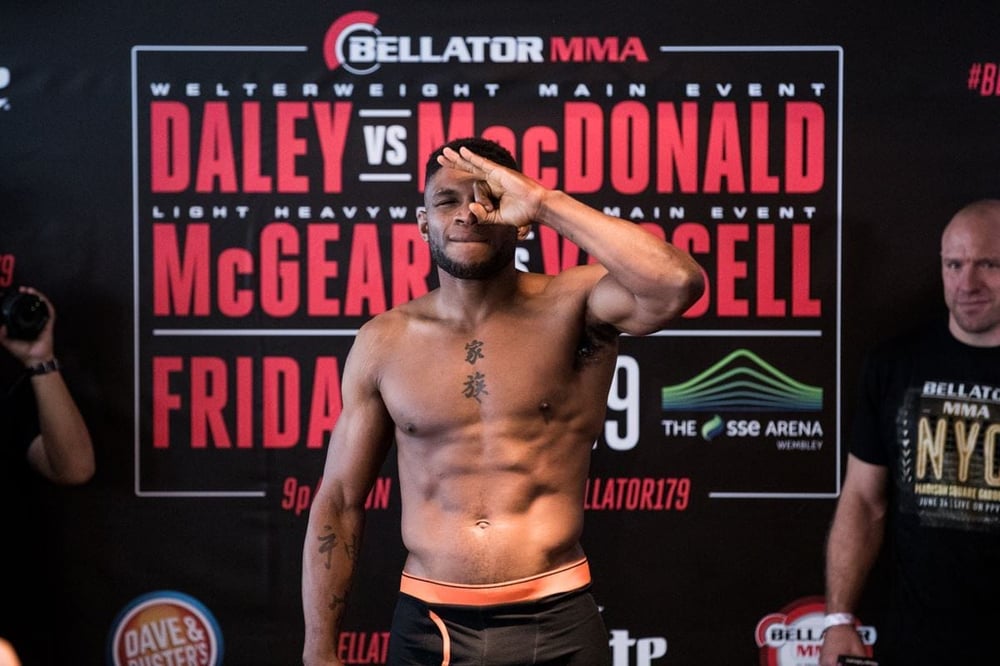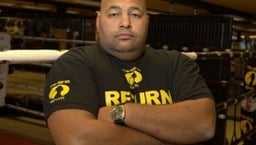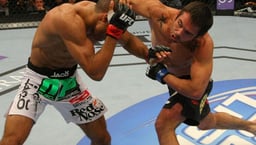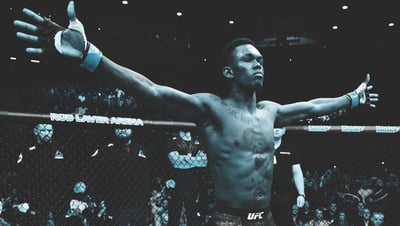What a fighter says to you at a fight week press conference and what they truly think are two very different things. Face it, you are, in that moment, not too dissimilar to the opponent they are set to fight in less than forty-eight hours. Dictaphone or notebook in hand, you are a nuisance, an inconvenience, an enemy, something foreign to them that must be conquered. You pull this insight not from their words, those soundbites that almost tumble out of a dry mouth on a day like today, but from the washed out, exasperated, I’m-trying-to-hold-it-together look on their face.
It is this way because you are asking them to engage and be human at a time – twenty-four hours from the weigh-in – they couldn’t feel any less human, nor ready to engage. Running on fumes, these fighters will have often skipped breakfast, reduced fluids and be knee-deep in the process of readying their mind and body for more cutbacks throughout the day, as well as a necessary training session that evening.
This is the weight cut. It’s the thing near enough every fighter on the planet hates and dreads, the final obstacle they must overcome before hitting the scales and enjoying the best moment of their fight preparation – the post-weigh-in meal. Remove the weight cut and you’d be hard-pressed to find a happier breed than fighters, but it does exist, it’s crucial to competition and, regrettably, it has a way of stripping a fighter of their energy, their humour and, in time, their will to live.
“I’ve seen better days,” says welterweight Paul ‘Semtex’ Daley in Stratford, twenty-four hours before he weighs in for a main event fight at Wembley Arena. “I don’t know why they schedule these press events the day before the weigh-in. Plus, we’re staying in Wembley and we had to drive an hour-and-a-half to get here. It’s not ideal, but it’s got to be done.”
Daley, 33, smiles through it, as they all do, but the prodding of that particular spot – that bone of contention – sparks something in him. The bullshit evaporates, the pretence falls. It now feels okay, I sense, for him to laugh about it; gone is the straight face and the forced good manners. Apparently, rather than hate the fact I’ve brought it up – essentially reminding him of what’s to come – Daley seems thankful for the opportunity to vent and express himself and, though he chooses not to, perhaps go in search of sympathy or a shoulder on which to cry.
“Right now I feel pretty tired and a little bit drained and a little bit hungry and a little bit thirsty, but it’s part of the job,” he tells me, as I look directly at his dry, crusty lips and wonder when they last went anywhere near a bottle of water.
“Compared to what it used to be like, though, now it’s easy. The weight cut used to be terrible. But, with age, I’ve become more disciplined. I’ve got a great missus now and kids and my habits have changed. As a young man you’ll go out and party and drink in between fight, whereas now I’m spending time with my kids and my diet doesn’t really change whether I’m training for a fight or at home. I eat healthily.”
Twenty-four hours from weighing in, it’s all about comfort in numbers. If not from coaches or training partners or friends or family, this comfort can be extracted from simply being among peers. Daley, for instance, is among peers in London. There are other fighters set to appear at Wembley Arena on Friday, fighters who, in this moment, are going through the same ordeal. Some handle the cut better than others. Some fake it better than others. Most, though, will tell you they could do without it.
“To be honest, I’m not too bad,” says light-heavyweight Linton Vassell, a smile on his face, also relieved to be asked the question; the elephant in the room confronted. “Previously, I’d pretty much not eat anything at all. But, as the fights go on, you sort of learn what your body’s like and how best to make the weight. I was able to have breakfast this morning and on the way here I had some oats and some protein powder. My belly isn’t full but it’s got some food in it, so I’m not feeling too bad.
“The good thing, also, is my weight is pretty low. Maybe this evening, when there will be no carbs, I’ll start feeling a bit more angry and not want to do much. But it’s all part of the package. I’ve been here before.”
As journalists, we want these men to like us, to open up to us, to trust us. Yet, during fight week, when enemies are plentiful, we, the journalists, are seemingly never more unlikeable. Vassell, a man in the know, laughs about that.
“I used to hate doing interviews the day before the weigh-in because I was a bit more moody,” he admits. “I’d just eat protein and go the whole week without any carbs or sugar. I’d have no energy.
“I’ve definitely learnt over the years how to do it properly, though. I woke up this morning really pleased with what I weighed. I was like, sweet, I’m going to have breakfast and then I’ll have a little bit of food later.”
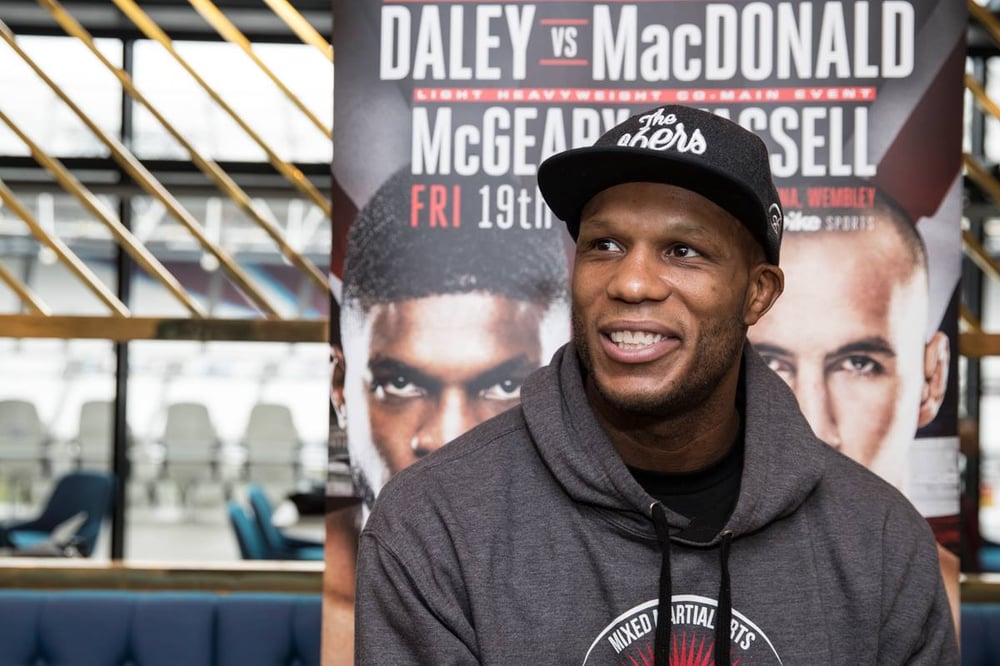
They’re not all like this. Not every fighter is cutting back on calories and counting down the hours. Some, like Cheick Kongo, the six-foot-four Frenchman set to appear on the Bellator 179 main card, were blessed with dimensions from an early age that ensured they’d never have to worry about hitting a weight target or stripping weight during fight week. He, after all, is a heavyweight.
There are men, also, like Liam McGeary, the former Bellator light-heavyweight champion, who today carries the widest, toothiest grin in the room, for he knows what’s around the corner and feels no way about it. To him, this is still fun, no big deal, and it has been this way since he decided to operate in the 205-pound division as opposed to cutting down to middleweight (185-pounds).
“Do you see this smile on my face, man?” he says. “I feel great. I don’t cut weight like all these other fuckers. They cut down and can’t eat this and can’t eat that. I feel on top of the world.”
As if to prove a point, McGeary then asks Paul Daley, sat not far from him, if he feels happy twenty-four hours from weighing in. Daley, still keeping up appearances, tries to put on a smile, put on a front, but it’s a veneer shattered by a subsequent shrug and roll of the eyes. McGeary can’t understand. He perhaps never will.
“At one point I actually had to eat up to the weight,” he goes on to say. “I’d get to fight week and spend the whole week eating just so I could put weight on and get close to the weight limit. When I first started, I stood on the scales with a pair of jeans on and wouldn’t even make 91-kilograms (200-pounds). But I fight at 205 because I don’t want to cut weight to 185. My legs are too skinny. My legs are too lean, I mean.”
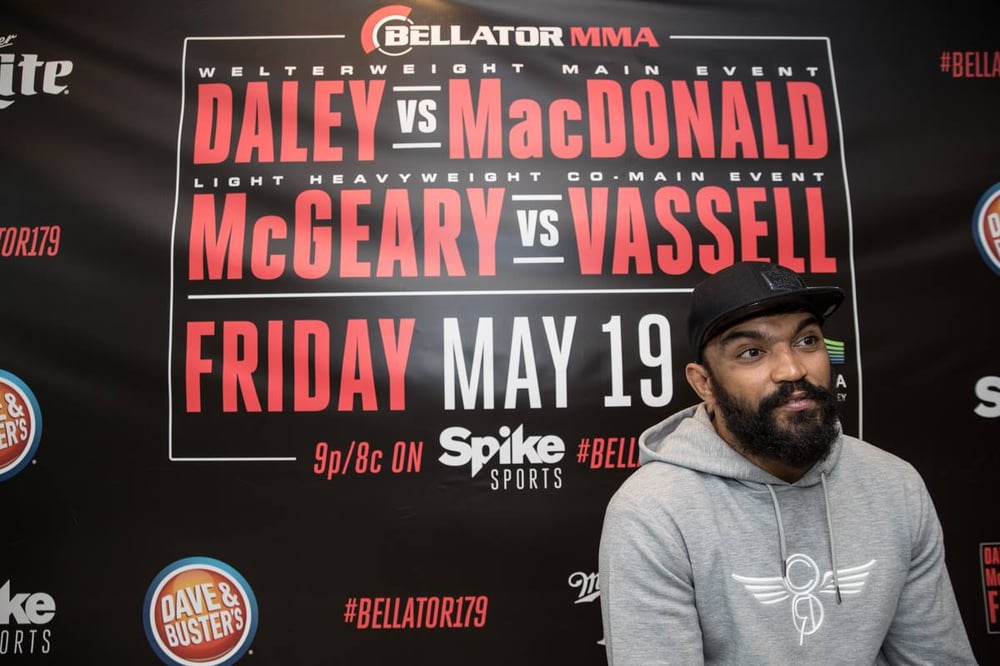
For McGeary, 34, much of the hard work is done. There will be no need for a final workout this evening in order to drop weight; indeed, so relaxed is Liam, he will soon joke about getting a beer from the bar. Vassell, meanwhile, his opponent on Friday, isn’t quite so fortunate. A light-heavyweight all of six-foot-four, Vassell, 33, still has some work to do when he gets back to the hotel later today.
“I’m going to hit some mitts, go on an elliptical with the sweat suit on and get some more pounds off,” he tells me. “Then I’ll probably just go in the sauna for a while. Nothing too strenuous but enough to get my weight down so tomorrow I’ll probably wake up around 95 or 96-kilos (210-pounds). Then I know I’m good.”
This all comes with experience, he explains; this knowledge you’re on the right path and that there’s no need to panic when food and water is in short supply. A professional mixed martial artist since 2008, Vassell has made his name both on the British circuit and in America, and in addition to growing as a mixed martial artist – improving techniques, toughening up – he has learnt how to go about taking care of himself in between fights, something which stands him in good stead on a day like today.
“I’m so anal with the way I cut weight,” he says. “I diet anyway, but, when I’ve got a fight, I like to do ten weeks of clean food and then one day as a cheat day. I think that’s very important. I also stay hydrated. I drink a good two gallons, which is probably seven-and-a-half or eight litres, pretty much every day, if possible. I think that’s really important.
“I always try and get the weight lower and lower every couple of days so that when it comes to the weigh-in I haven’t got fourteen pounds or ten kilos to lose like a lot of people do. I think that’s why they mess up so much.”
These men, Daley, McGeary and Vassell, will all step on the scales in approximately twenty-four hours and, almost in tandem, let out a huge sigh of relief. Daley will look to hit the 170-pound mark, as will his Canadian opponent Rory MacDonald, while Vassell and McGeary, naturally bigger men, are shooting for 205-pounds. However, in that moment, that hallelujah moment, they may as well all weigh the same. They certainly think the same, behave the same, and care little about fighting each other there and then. In fact, the idea of fighting, competing, couldn’t be further from any of their minds twenty-four hours from first bell.
“It’s going to feel good when I make weight,” says Daley, salivating, almost picturing the moment – as well as the food and drink – in his mind’s eye. “Because you have to reduce your water intake, you really look forward to drinking after the weigh-in. Also, my auntie has a restaurant on Wembley high street that is within walking distance of the arena. I’ll be going to see her tomorrow and will eat food like we would on a Sunday at my nan’s. I can’t wait.”
Before that, Daley will separate himself from the pack and take the chance to feel normal again.
“It’s just about recovery after the weigh-in,” he says. “A lot of the time, before eating and drinking too much, I’ll just go back to the hotel room and lie down for a little while. Not because I’m exhausted, but because I’m a bit relieved and I want to let my body relax a little bit. That’s my best moment actually – going back to the hotel room, lying on the bed for a couple of hours, and then getting the fluids back in and getting some food.”
Akin to a death row prisoner’s last supper, the meal of choice for a fighter is always a point of intrigue. It says so much about them, so much about their personality. Some go all-out, consuming anything and everything they can get their hands on, while, for others, a more strategic, thought-out approach tends to work; some let the joy of hitting the mark get the better of them, only to live to regret it the next day, while others, those longer in the tooth, have made their mistakes in the past and now know better than to gorge on waffles and ice cream with a fight just around the corner.
“Weigh-in day is the best,” says Vassell. “You go through all that pain of making weight and then you’re able to go and rehydrate with fluids, which is probably the best part. I’ll drink for maybe a good hour or two, get a good two litres into me, and then go and have my first meal which will be chicken, sweet potato and rice. I’ll cover it with salt to get all that sodium back into me.
“I try and eat every two hours but I’m always drinking. By the time the day ends, I will have taken on a good six litres of water. I’ll even wake up in the night if need be and keep guzzling water. It’s a big, big factor, man. You need to be hydrated for the fight. Otherwise you’ll feel it and you’re going to crash.”
So far, so good. Only then Vassell’s eyes light up and he licks his lips and I realise all of a sudden the fight, the very reason we convene and converse, has vanished entirely from his mind.
“An hour or two hours later, I’ll have my best meal, which is cheesecake,” he continues. “I won’t eat cheesecake throughout camp. Even when I’m not in fight camp, I won’t eat too much naughty stuff. I know what I’m like. After one fight I had twenty-four pieces of cheesecake. It was probably because I lost. I was comfort eating. But I quickly noticed it on my belly.
“Cheesecake is the one. When I get that in me, I know the job is done.”
As Paul Daley and Rory MacDonald prepare to face off for the many cameramen congregated inside one of the rooms at the Olympic Stadium, in what is the pièce de résistance of media day, MacDonald, a former UFC title challenger, all sharp cheekbones and prominent brow, turns to face his partner, Olivia, stood nearby. She’s among the melee of gatherers, a phone in her hand, positioned as if about to take a picture, and MacDonald, a look of pain and seriousness on his face, just about manages to say, “Olivia, can you take pictures from the other side.”
“What?” she replies.
“Never mind,” he says, followed by a sigh, a tut and a roll of the eyes.
Weight-cutting in a nutshell: Rory MacDonald doesn’t even have the energy to repeat a question.
It’s at this point I decide not to ask him how he feels.
